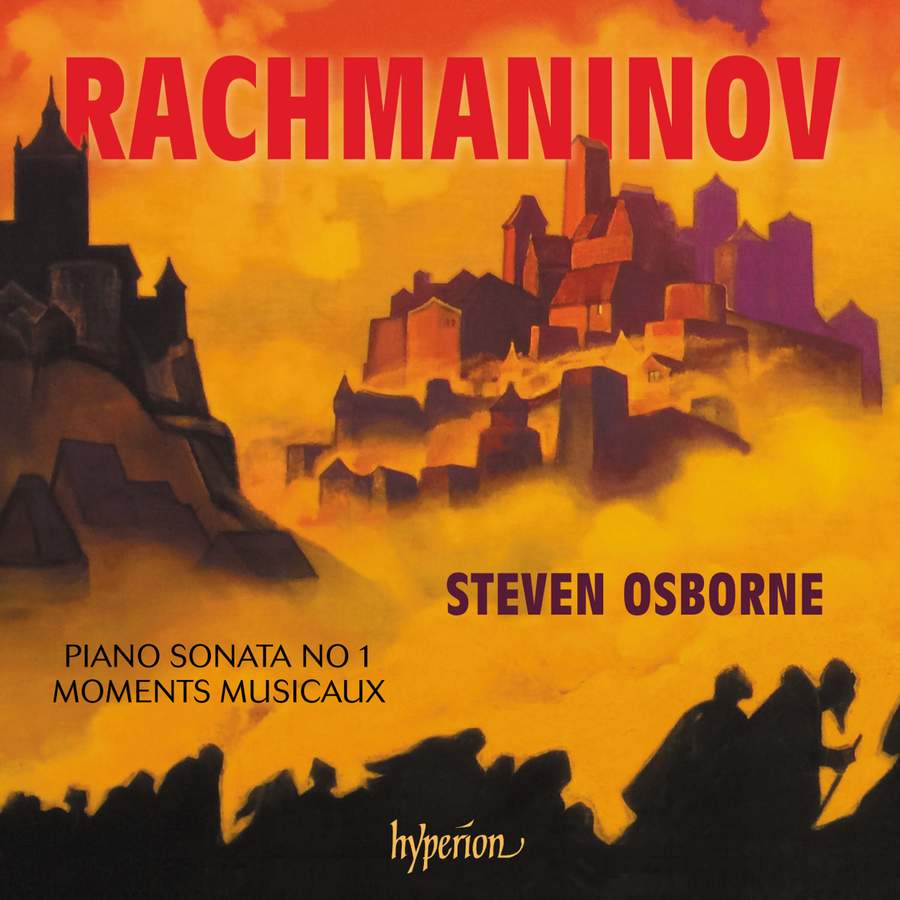RACHMANINOV Piano Sonata No 1. Moments musicaux (Steven Osborne)
View record and artist detailsRecord and Artist Details
Genre:
Instrumental
Label: Hyperion
Magazine Review Date: 06/2022
Media Format: CD or Download
Media Runtime: 74
Mastering:
DDD
Catalogue Number: CDA68365

Tracks:
| Composition | Artist Credit |
|---|---|
| Sonata for Piano No. 1 |
Sergey Rachmaninov, Composer
Steven Osborne, Piano |
| (24) Preludes, Movement: D minor, Op posth |
Sergey Rachmaninov, Composer
Steven Osborne, Piano |
| Fragments |
Sergey Rachmaninov, Composer
Steven Osborne, Piano |
| Oriental Dance |
Sergey Rachmaninov, Composer
Steven Osborne, Piano |
| Vespers, 'All-Night Vigil', Movement: Lord, now let your servant depart (Nunc dimittis) |
Sergey Rachmaninov, Composer
Steven Osborne, Piano |
| (6) Moments musicaux |
Sergey Rachmaninov, Composer
Steven Osborne, Piano |
Author: Patrick Rucker
The First Sonata is seldom encountered in performance, due to its half-hour length and the myriad interpretative challenges it poses. Rachmaninov entrusted its premiere to his friend and colleague Konstantin Igumnov, who played it as part of an all‑Rachmaninov recital in Moscow in October 1908. Interestingly, it was only after Igumnov had introduced the work to Germany the following month, with concerts in Berlin and Leipzig, that the composer confided in him that the sonata was originally a response to the Faust legend, with its three movements depicting Faust, Gretchen and Mephistopheles – precisely the plan of Liszt’s Faust Symphony. Whatever programmatic elements remain discernible in the final product, Osborne works wonders as he renders the monstrously dense textures of the sonata pellucid and lends its meandering melodies direction, meanwhile giving the finale its full measure of infernal madness. Resisting every temptation to overplay, Osborne shapes confusion into dramatic purpose, lovingly enveloping the whole in imaginative insight.
If one were to attach a single descriptor to these Moments musicaux, it would surely be variety. Each emerges as its own vivid microcosm, so distinctive that choosing individual numbers for comment is difficult. Whether the alternating funereal despair and redolent sweetness of the vast B minor, the frantic flight of the Presto E minor or the tectonic monumentality of the Maestoso C major, all seem uniquely apt. But for maximum pleasure, at least the first time, listen to all six as a set without pause.
The D minor Prelude, first published in 1973, 30 years after the composer’s death, is among the three smaller pieces here composed in 1917 on the eve of Rachmaninov’s departure from Russia. They, along with the touchingly understated 1915 transcription of the Nunc dimittis, provide the ears a chance to dial back to less grandiose concerns.
Finally, one is left wondering where, in the first quarter of the 21st century, one might turn for more idiomatic, more intelligent or more beautiful Rachmaninov-playing.
Discover the world's largest classical music catalogue with Presto Music.

Gramophone Digital Club
- Digital Edition
- Digital Archive
- Reviews Database
- Full website access
From £8.75 / month
Subscribe
Gramophone Full Club
- Print Edition
- Digital Edition
- Digital Archive
- Reviews Database
- Full website access
From £11.00 / month
Subscribe
If you are a library, university or other organisation that would be interested in an institutional subscription to Gramophone please click here for further information.




